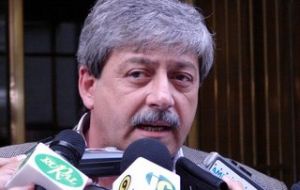MercoPress. South Atlantic News Agency
Argentine farmers and government prepare to talk
 Eduardo Buzzi president of the Agrarian Federation.
Eduardo Buzzi president of the Agrarian Federation. Yielding to pressures from provincial governors and a slowing down of the economy, Argentine farmers are expected to lift the strike on Monday and resume negotiations with the administration of President Cristina Fernandez de Kirchner, which allegedly has also indicated willingness to review some of the most controversial issues.
"I don't have the authority to confirm the lifting of the strike but I can say that the liaison committee is anticipating the meeting for Monday in Buenos Aires", said on Sunday Eduardo Buzzi, who has become the spokesperson for the four farmers' organizations that have been in conflict for 69 days to protest export taxes on grains and oil seeds. "Those who have the institutional responsibility must take notice of the message. We can't have the country paralyzed because of lack of rationality. Tomorrow we're going to pave the way so that we can discuss a solution and one of those priorities is export taxes", added Buzzi president of the Agrarian Federation. Farmers originally were supposed to asses the situation at the end of the current week long stoppage next Wednesday. The long conflict and the government's stubbornness has taken its toll: President Cristina's image has dropped to 25% (only six months in office), inflation is out of control, Argentines are beginning to get tired of the "two headed government" (Cristina and her husband, former president Nestor Kirchner) and want a quick end to the dispute, while financial jitters cost the Central bank a billion US dollars in reserves and tax collecting was down. "Argentina is suffering inflation, but the camp is not to blame; inflation was increasing well before the conflict", added Buzzi. Apparently governors, the business community and the Catholic Church, have been playing a back-stage role convincing both sides it's time to end the dispute which is making people restless, there have been outbreaks of violence and optimism in the camp fuelled by international commodities prices has began to dwindle. Besides the fact that it is in nobody's interest to have a weak president at the start of her mandate. Argentina is a leading world exporter of soy, corn, wheat, beef and dairy produce. Apparently in Monday's liaison meeting farmers will agree to lift the stoppage and will reiterate their request for an urgent meeting with President Cristina Kirchner to address not only the export taxes dispute but medium and long term farm policies to take advantage of the exceptional global environment for agriculture. "Camp is always willing to dialogue" said Luciano Miguens president of the Argentine Rural Society, adding that "we're convinced that dialogue is the only way ahead". He pointed out that "we understand that calling for dialogue with government while protesting is not the best of circumstances" and admitted that farmers were well aware that "the economy is slowing down" which is not good for Argentina. "There's a general outcry to end the conflict and we respect that and we are going to act on that", said Hugo Biolcati, vicepresident of the Argentine Rural Society. Meantime the head of the Kirchner block in Congress and occasional spokesperson for the former president, Agustin Rossi said "it would be very good news" if the camp suspends the protest adding that when it happens "dialogue will resume immediately". The vicepresident of the Argentina Industrial Union, Jose Ignacio De Mendiguren was quoted saying that "we're calling for dialogue. All sides must sit and talk: we don't know when Argentina will again have such a favorable world scenario; we must take advantage of it". "We must leave passions aside and sit to talk" he added in line with a summons from Argentina's main business, financial and manufacturing sectors which was published in the Sunday edition of the country's main newspapers.




Top Comments
Disclaimer & comment rulesCommenting for this story is now closed.
If you have a Facebook account, become a fan and comment on our Facebook Page!